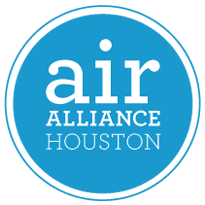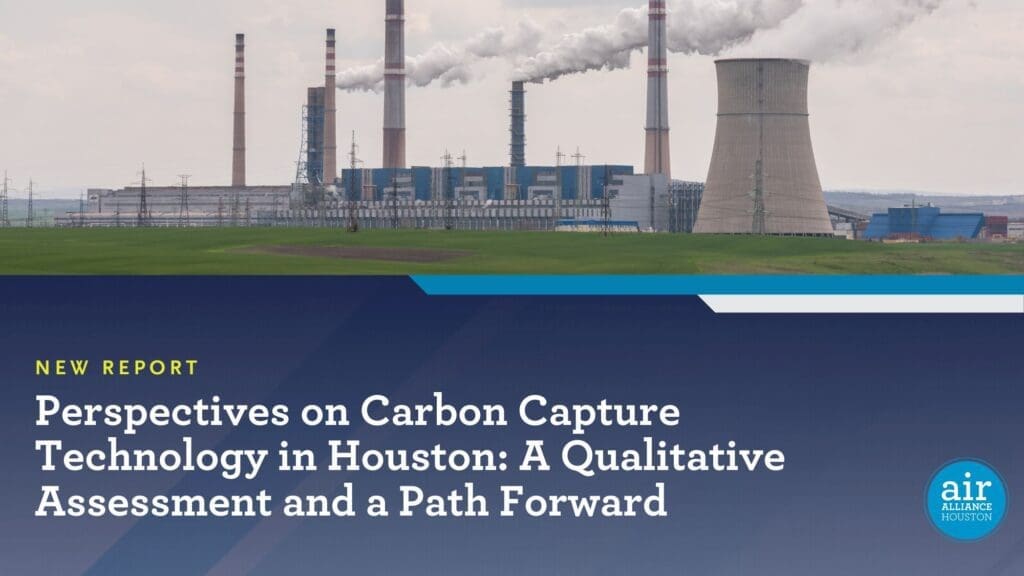Limited Understanding and Doubts Surround New Carbon Capture and Carbon Management Technology in Houston, Study Finds
Houston, Texas – A one-year study conducted by Air Alliance Houston (AAH) in the Ship Channel and Fort Bend areas revealed that residents near industrial facilities have alarmingly low levels of understanding of the carbon capture and storage (CCS) technology proposed at scale in their communities. This lack of information leaves residents ill-equipped to advocate for themselves as significant investments in such projects begin to materialize. The study also highlights residents’ concerns about climate change and urges elected leaders to engage communities in conversations about CCS projects.
“CCS is the business of industry, universities, government and regulators, oftentimes leaving the community where projects will be located out of the discussion,” said Alexander Spike, Climate Justice Coordinator with Air Alliance Houston and lead author of the study. He added, “Communities need to be taken seriously, with robust dialogue, to ensure that genuine, good-faith considerations related to CCS projects remain founded in, and address, community priorities.”
In May 2023, the U.S. Department of Energy allocated $242 million to nine companies to implement CCS, a new and complex process to capture and store carbon emissions at the source of the pollution. Four Houston-based companies have plans to utilize these funds for large-scale commercial CCS projects. However, there are concerns about potential adverse effects on communities, as the new technology has yet to be extensively tested on a large scale.
Houston is known as the “energy capital of the world” due to the large footprint of the fossil fuel industry, including a vast petrochemical complex along the Houston Ship Channel and the biggest coal-fired plant in Texas (W.A. Parish) in neighboring Fort Bend County. The major investments planned by the fossil fuel industry and the federal government are expected to expand the footprint further, potentially burdening communities already grappling with air pollution, disease, and lower life expectancy.
Spike emphasizes the need for full transparency about the potential risks and drawbacks of CCS technology for carbon reduction and air pollution broadly. “While carbon capture is presented as a viable and effective solution by the Department of Energy and others, there are reasons to be skeptical of these claims, particularly as the technology is scaled up and implemented in environmentally vulnerable communities,” he said. “Society seems to be embracing this technology without complete information, relying on an industry with a vested interest in promoting its perceived effectiveness.”
AAH urges local elected leaders to take a greater interest in assessing the efficacy and impacts of this technology, especially what happens to the other air pollutants emitted alongside carbon, and in directing investments toward climate change solutions that do not reward the same facilities that are currently polluting neighborhoods with millions of future investments. Houston’s local leaders must develop a deeper understanding of the specific carbon capture proposals in the region and gauge and engage the community regarding expanding carbon capture infrastructure. This calls for additional research, education, community engagement, and a comprehensive understanding of the investments being made.
The report and reflections on CCS technology in Houston were discussed at a live webinar yesterday hosted by AAH and partners. Watch the recording of our report release webinar (Wed., June 21, 2023).
Statements from Webinar Speakers
Carmen Cavezza, Climate Justice Organizer for the Coalition for Environment, Equity and Resilience (CEER) said, “Community needs to be involved and have access to information on health impacts and long-term safety of CCS. The public needs to know: who is going to manage long-term liability on CCS? Communities on the frontlines are left without answers when health issues arise, and they can’t determine who is responsible. Companies rarely authentically engage with the community to inform them of their plans, or even better, treat community members as partners in the co-development of solutions that genuinely address the needs of the community.”
Luke Metzger, Executive Director for Environment Texas said, “America has vast solutions to climate change at the ready, including renewable energy and electric vehicles. To fully decarbonize, we may need CCS as a last resort, but we should limit its use to areas where alternatives aren’t available and strictly regulate it for public safety and health.”
Virginia Palacios, Executive Director for Commission Shift said, “The Railroad Commission has a poor track record of overseeing injection wells and pipeline safety in Texas, and at this point they can’t be trusted to oversee these new carbon capture technologies, such as carbon dioxide injection wells or pipelines. Our freshwater aquifers and safety are at stake.”
Read the full report here: Perspectives on Carbon Capture Technology in Houston: A Qualitative Assessment and a Path Forward
Summary Sheet: What Houstonians Need to Know About Carbon Capture
About Air Alliance Houston
Air Alliance Houston is a non-profit advocacy organization working to reduce the public health impacts from air pollution and advance environmental justice through applied research, education, and advocacy. For more information and resources, please visit www.airalliancehouston.org.
About The Coalition for Environment, Equity, and Resilience (CEER)
CEER’s mission is to raise awareness of the connections between pollution, place and the public’s health. CEER is a collaborative made up of 28 nonprofit organizations who are committed to working together to create a region that is equitable, environmentally sustainable and economically strong where residents have the opportunity to live, work, learn, play, and pray free from environmental hazards. To make that vision a reality, we advocate for public and private investment in protecting communities by cleaning up hazards that contaminate our air, water, and land, while at the same time prevent or reduce flooding. For more information, visit www.ceerhouston.org.
About Commission Shift
Commission Shift is a Texas-based nonprofit building public support to hold the Railroad Commission of Texas accountable to its mission in a shifting energy landscape. We educate and organize a wide array of Texans to build support for changes at the Railroad Commission that improve the agency’s function, transparency, and accountability to the many people and places impacted by the oil and gas industry. For more information, visit www.commissionshift.org
About Environment Texas
Environment Texas is a nonprofit advocate for clean air, clean water, parks and wildlife, and a livable climate. For more information, visit environmenttexas.org.
Contact: Riikka Pohjankoski, riikka@airalliancehouston.org, 713-589-7079
###

